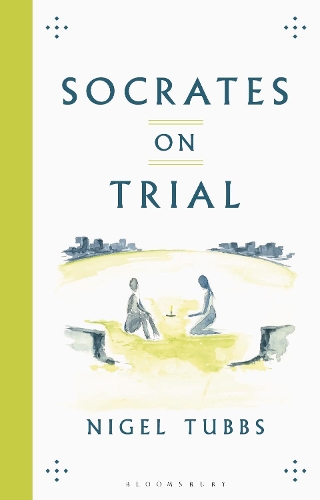
Socrates On Trial
(Hardback)
Available Formats
Publishing Details
Socrates On Trial
By (Author) Nigel Tubbs
Bloomsbury Publishing PLC
Bloomsbury Academic
7th October 2021
7th October 2021
United Kingdom
Classifications
Tertiary Education
Non Fiction
Social and political philosophy
Politics and government
183.2
Physical Properties
Hardback
320
Width 138mm, Height 216mm
517g
Description
Named by Rowan Williams as one of his Books of the Year (2021) in the New Statesman. Socrates On Trial tells of Socratess return to a modern city that is plagued by prejudice, privilege and populism. On resuming his questioning in the agora he is arrested, interrogated by his prosecutors, questioned by his Judge, and confessed to by his inquisitor. On a Festival Day, he explores a new model for the just city --a city based not on mastery but on learning --before offering a new apology to the court that will, once again, decide his fate. This new/old Socrates offers the city a renewed vision of justice by reconceptualizing the meaning and significance of thinking and education. From the force of Socratic questioning, he unfolds a different logic of truth, freedom, and justice. His conversations exert a gravitational force that draws key cultural elements of the city -- property, wealth, money, family, essence, gendered and racialized identities, production, distribution and consumption -- into its educational orbit. At stake here is the vulnerability of modern democracy to authoritarian leaders and their sponsors. Influenced by sophisticated propaganda peoples frustration with democracy is channeled into visceral anger on the one hand, and into disillusioned scepticism and cynicism on the other. Belief in truth and education collapses in exhaustion and fatigue, caught in the headlights of seemingly irresolvable and petrifying rational paradoxes that block all paths to social justice. Socrates On Trial, describing the return of Socrates to the modern city, heralds a new education for such a city.
Reviews
Socrates on Trial makes us look at our world in new ways, urges us to rethink education, and is a much-needed plea for a Socratic uprising in education. Consumerism, screen-addiction, the exploitation of the earth resources, racial injustices Tubbs argues that we cannot afford to remain in the world of shadows, and calls for an education that is profoundly self-critical and philosophical. In holding up a mirror, the book benefits and inspires all of us. * Emma Cohen de Lara, Senior Lecturer In Political Theory, Amsterdam University College, The Netherlands *
What if Socrates were to return today, and insist again on asking uncomfortable questions of the propertied and the powerful Tubbss reply in this compelling philosophical fable is as fascinating and as shocking as its stylistic inspiration in Dostoyevskys Grand Inquisitor. His Socrates discovers that the examined life is as unwelcome today as it was in ancient Athens, that property and power remain as allergic to questioning as then and, in a fatal ironic twist worthy of its protagonist, that it is now he who must defend himself against the failure of his efforts to lead others out of the cave. Tubbss Socrates, questioning our culture and his own contribution to it, learns that, although he must fail again, this time at least he can fail better. * Howard Caygill, Professor of Philosophy, CRMEP, Kingston University, UK *
This book is quite extraordinary at the literary as well as the philosophical level. A tour de force. * Josh Cohen, Professor of Modern Literary Theory, Goldsmiths, University of London, UK *
In examining the divided life of our modern universities and politics, this book brings hope for the future: a passion we might all share, experience and thoughtfully act upon. * J. Scott Lee, Former Executive Director, Association for Core Texts and Courses, USA *
Author Bio
Nigel Tubbs is Professor of Philosophical and Educational Thought, University of Winchester, UK. He is the author of seven titles on philosophy and education.
